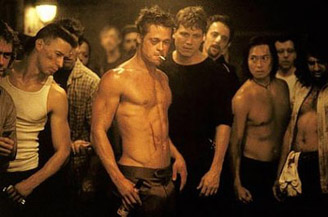Before Their Time: Fight Club
By Daniel MacDonald
April 30, 2009
BoxOfficeProphets.com

You don't talk about Fight Club. That's the first (and second) rule of the titular male support group run by one Tyler Durden (Brad Pitt). Yet since its theatrical release in 1999, Fight Club has been a popular topic of conversation among movie fans, academic scholars, and concerned parents' groups alike. It's a wholly polarizing piece of work: those who like it tend to love it, while detractors save a special, scornful place in their hearts for this knuckle sandwich of a movie. Regardless, it's hard to deny that Fight Club was one of the most original, provocative, and ambitious films of the '90s, and its influence has resounded throughout the industry in the years since. The two-disc special edition DVD was a big seller, and its inevitable Blu-ray release promises to do similar business as rabid fans upgrade their collections to enjoy high definition blood spatter. University campus poster sales regularly feature Fight Club paraphernalia amongst their wares; and millions of people worldwide have given at least cursory consideration to exactly where that bar of fancy soap came from...
In contrast to its eventual success, David Fincher's Fight Club landed with a proverbial thud when it hit theatres in October, 1999. While some critics championed the film, others ravaged it with what could very nearly be categorized as outrage. Los Angeles Times film reviewer Kenneth Turan remarked, "What's most troubling about this witless mishmash of whiny, infantile philosophizing and bone-crunching violence is the increasing realization that it actually thinks it's saying something of significance." Even though he gave the movie only two stars, effectively a "Thumbs Down", Roger Ebert at least was able to nail its polarizing nature, saying, "Fight Club is... the kind of ride where some people puke and others can't wait to get on again."
Despite a reasonable opening weekend, taking the number one spot thanks, no doubt, to its headliners Brad Pitt and Edward Norton, Fight Club earned a mere $37 million in its theatrical run. Foreign sales boosted it just over the $100 million mark, but with a reported production budget of $65 million, it probably didn't break even once marketing costs are factored in. Producer Art Linson details the gory details of presenting Fight Club to the Fox studio executives, and their altogether vicious reaction, in his excellent book, What Just Happened?.
Personally, I was quite taken by Fight Club before it even hit the scene. A good friend of mine and I, both working at a video store at the time, watched the theatrical trailer (included at the head of a VHS copy of Wing Commander) over and over again, trying to figure out what it was all going to be about, and especially why a giant metal sphere would be rolling through an office tower lobby. We showed up opening night, and saw the movie three times in its first week. I was a Fincher fanatic, madly in love with his previous efforts Se7en, The Game, and, yes, even Alien 3; Fight Club seemed like Fincher taken off the leash, bringing a bold new cinematic vision to the masses that would clearly go unappreciated for some time.
So why the disconnect between unsuspecting moviegoers? The most obvious culprit, based on negative reviews and word-of-mouth, was a complete misreading of the movie's message. Accusations of 'fascism', 'misogyny', and 'glorifying violence' were liberally leveled at the picture, as if it were an endorsement of the type of behavior in which Tyler convinces the unnamed narrator to take part. But it's not. Fight Club is not a movie about superficial philosophy and the male's need for an outlet with which to place his aggression; Fight Club is a satire of all that. Fight Club is a comedy.
I admit it - on first viewing, as I sat in the theater watching Pitt and Norton beat each other silly in the darkened parking lot and ask questions like, "How much can you know about yourself if you've never been in a fight?" it occurred to me that I hadn't ever been in a fight either (for the record, I was challenged to one in high school: I showed up, he didn't). Maybe I should try it. As the film goes on, it becomes increasingly clear just how ridiculous the thesis presented is meant to be taken, leading up to the mind-blowing twist and sort of feel-good ending. None of the picture was meant to be taken seriously, and the second time around, I laughed my ass off.
Every element of Fight Club is taken to an absurd level, from Meat Loaf's huge breasts to the CGI-enhanced sex scene to Jared Leto's character existing for the express purpose of having his face smashed in. Even the cinematography is ridiculously dark, so much so as one can barely make out what's happening some of the time - as if the lighting were mocking the movie's murky tone. Ironically, if Fincher weren't such a good filmmaker, and Fight Club's dark vision not so successfully realized, more people might have been in on the joke. As it happened, however, people read Fight Club as a war cry for disaffected, financially stable young males whose fathers didn't love enough, and with this they were mighty offended.
There are still those for whom Fight Club continues to be a prime example of all that is wrong with movies today, who see only the violent, realistic portrayal of bare-knuckles fighting (as if presenting a sanitized version would be better in the long run for young, impressionable minds) and the raw masculinity, not the criticism of same woven beneath. And that's fine: the best, most lasting films are those that provoke strong reactions, both positive and negative. But for me, Fight Club will always represent the power that movies hold to affect us while they entertain, and it deserves to be counted among the great movies of the past hundred years.